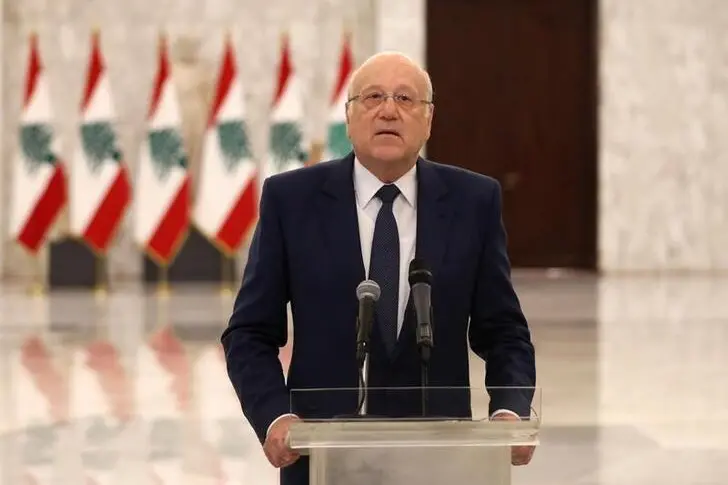PHOTO
There is nothing new about Lebanon’s “new prime minister.” A billionaire, of a certain age, Najib Mikati has, in fact, been in the job twice before. His plan to approach “Arab brothers to hold Lebanon’s hand and stop the freefall” is also, sadly, not new.
Lebanon’s problems today are the direct result of the absence of a strong state, one that has grown reliant on aid in lieu of building a strong economy. The UN estimates that 78 percent of the country’s population is now living in poverty. Where warring factions have empowered and enriched their leaders, the state has successively failed to provide the essential services and opportunities that its people need.
As Mikati formed a new Cabinet of old faces this month, his vows to ease the country’s woes fell on deaf ears as Lebanon plummets toward one of the worst economic collapses in modern history. According to the World Bank, the country is enduring its most significant economic depression since the mid-1800s, amid chronic systemic issues, an absent government and the effects of the pandemic.
The Lebanese pound, once pegged to the dollar, has lost 90 percent of its value in the past two years, in what is the country’s largest peace-time economic and financial crisis. Last month, Riad Salameh, governor of Lebanon’s central bank, said that the state could no longer afford subsidies as the country’s foreign reserves have been severely depleted.
In circumstances where the cost of staple foods has increased by 200 percent in the past year, the financial situation is dire. The new government has defended the lifting of subsidies as an unpleasant but necessary step to lead the country toward economic recovery. Without dollar subsidies, they have chosen to issue food cards, much as Hezbollah has done with its Al-Sajjad card scheme, to secure essentials at low prices.
The government has allocated $556 million to be distributed through these cash cards, with a plan to provide them to 500,000 of the most needy.
In circumstances where the central bank governor was caught with €90,000 ($105,000) in cash this month, and where the Organized Crime and Corruption Reporting Project last month reported that his offshore companies had assets worth almost $100 million, it is little surprise that the new government seems unable to alleviate the hopelessness of the Lebanese people.
Earlier this year the Carnegie Endowment warned that without reform Lebanon was heading toward becoming a failed state. The perpetuation of inequalities, in which the richest 10 percent of the population owns almost 70 percent of total wealth, has led to the dire economic situation the country is in today. The intertwined political and business elite have created a laissez-faire economy in which the rich are not taxed and public service provision provides levies to private business people.
With Human Rights Watch warning that millions in the country are at risk of famine, the seemingly eternal good times of Lebanon’s elites have led the country toward ruin.
As Lebanese MPs convened last week to confirm the new Cabinet, a power outage and a broken generator delayed the meeting by 40 minutes. The episode gave lawmakers a sense of the reality endured by millions who queue for up to six hours per day to buy fuel, often leaving empty-handed and unable to power generators at home.
While gas station owners hoard fuel — hoping to profit when prices rise and the remainder of the supply is stuck on tankers waiting for the central bank to part with precious dollars — daily life for the Lebanese people gets worse. Hospitals are unable to provide basic care without fuel and must rely on donations of diesel. At Rafik Hariri University Hospital, like elsewhere, patients are being asked to bring their own medicines or to simply go home.
The government’s solution, unsurprisingly, was to hike petrol prices last Friday by almost 38 percent in an effort to prepare the economy for an easing of subsidies. There was little surprise, therefore, that where the vacuous government failed, Hezbollah entered the fray, importing more than a million gallons of Iranian diesel fuel this week.
Arriving by land, though not at a border crossing and in the complete absence of any customs or police checks, the shipment (the first of many) not only provided relief to many ordinary Lebanese but also highlighted the incompetence of a government with which the militant group neither works in concert nor in competition. The delivery, portrayed in heroic terms, has served to underscore the helplessness of the government in securing aid from its traditional international partners.
While international donors wait for Lebanon’s political elite to usher in economic and political reforms to facilitate a bailout, the country’s corrupt and self-serving factions grow more entrenched and ineffective, at the expense of the Lebanese people.
- Zaid M. Belbagi is a political commentator, and an adviser to private clients between London and the Gulf Cooperation Council (GCC). Twitter: @Moulay_Zaid
Copyright: Arab News © 2021 All rights reserved. Provided by SyndiGate Media Inc. (Syndigate.info).





















